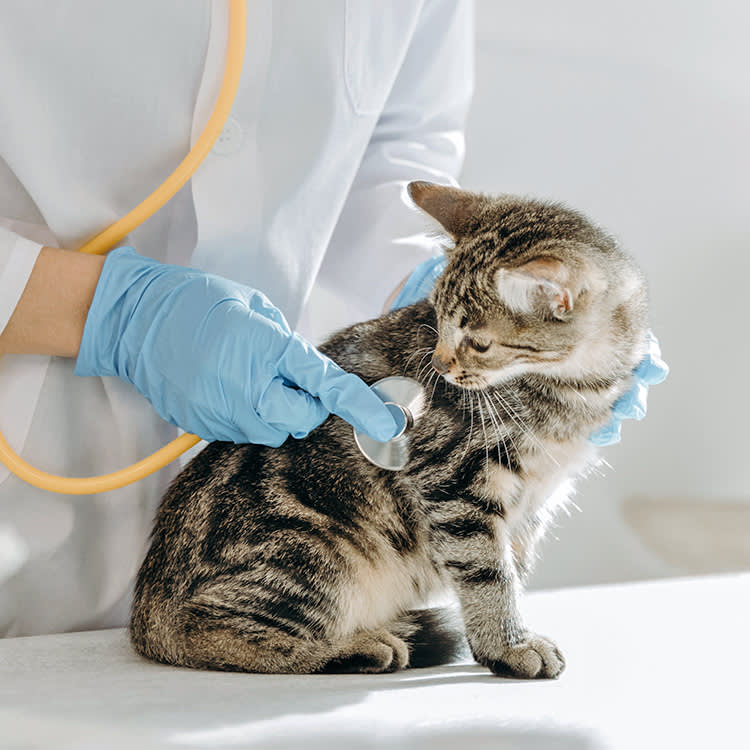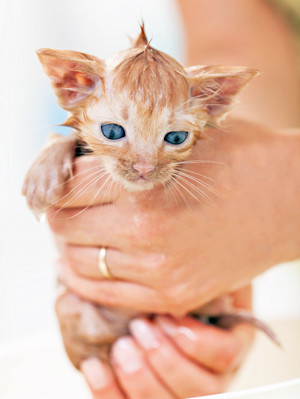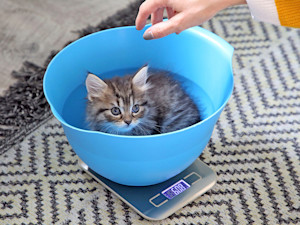Kitten Deworming Guide: When, How, and Why You Should Deworm
Gross, but necessary: Our expert explains all things deworming.

Share Article
In This Article:
When Can You Deworm a Kitten? Signs of Worms in Kittens Types of Worms in Kittens and Their Symptoms How Do Kittens Get Worms? How to Deworm Your Kitten Safe Practices for Deworming The Best Dewormer for Kittens
This news may be hard to hear: Your new kitten likely has worms. It’s a common issue, with intestinal worms affecting an estimated 25 to 75 percent of catsopens in new tab and a higher percentage of kittens. So, along with vaccinations, deworming should be on your mind when you bring your new kitty home.
But how and when should you do this? Let’s talk about deworming kittens so that you know your little one is protected.
Main takeaways
Worms are a common issue, so all kittens should take dewormer as soon as they’re old enough.
Heavy worms can cause vomiting, diarrhea, weight loss, and even death in young kittens.
When deworming kittens, use a product recommended by your veterinarian to ensure it’s safe and effective.
Depending on their lifestyle, kittens may need repeat doses of dewormer.
When can you deworm a kitten?
Most kitten-deworming products can be used on kittens as young as three to four weeks old. That means you can get an early start on deworming, so that they will be free and clear by the time they’re eating solid food. Be sure to check with your veterinarian first, before starting them on dewormer.

What are the signs of worms in kittens?
Intestinal worms live in — big surprise! — the intestines. So it should come as no surprise that most of the issues they create are digestion-related. They include:
Diarrhea
Vomiting
Weight loss
A pot belly
Severe worm loads can lead to a poor hair coat, incoordination or weakness, and pale or yellow gums. They can also make feces bloody, appearing as if a cat is bleeding from the anus.
Common types of worms in kittens, and their symptoms
In veterinary medicine, a lot of issues are described in food terms, and intestinal worms are no different. (So maybe don’t read this while you’re eating.) With that said, here are the most common types of worms you’ll see in kittens.
Roundworms
Adult roundworms look like spaghetti noodles. They live in the intestine and pilfer nutrients from the food your kitten eats. If enough of them are in there stealing food from your kitten, this can lead to vomiting, diarrhea, constipation, weight loss, and a poor hair coat. You may also see some of them in your kitten’s feces.
Hookworms
Hookworms are shorter and skinnier than roundworms and also live in the intestine, where they feed on blood rather than food. Because they are still stealing from the host, a kitten may experience diarrhea, weight loss, or even anemiaopens in new tab.
Tapeworms
Tapeworms are flat with rice-like, egg-containing segments that break off and are passed in a kitten’s feces. These worms also glean nutrients from the food your kitten eats, which can lead to diarrhea and weight loss. You’ll most likely spot the wriggling little egg sacks around your kitten’s anus or in their feces.
How do kittens get worms?
Intestinal worms, or rather their eggs, are everywhere. Eggs are shed by infected cats through their feces. After that, they have some pretty sneaky ways to survive for long periods in the environment, just waiting for an unknowing animal or human to pick them up.
Hookworm and roundworm larvae may be on the grass or in the dirt where your kitten lives, or they can be in the tissues of small creatures that your kitten may eat. These little guys can infect people, too. Your best defense: washing your hands thoroughly after scooping the litter box.
Tapeworms are a little different, because they require an intermediate host. This just means that when the eggs are shed from a cat, they can’t immediately infect another cat. They have to go through a flea or rodent first. A kitten then becomes infected through these intermediates. For instance, swallowing a flea while grooming or snacking on a rodent can put kittens at risk.
Not only are kittens susceptible to worms surrounding them in the environment, but they can also get them from their mother during pregnancy or through her milk as they nurse.
How to deworm your kitten
You don’t have to wait for a fecal test. Most veterinarians will recommend preemptively deworming your young kitten on the principle that intestinal worms are so common. Dewormers typically come as a liquid that you give your kitten by mouth. Most of them don’t mind it and may even see it as a treat. For those who are a little older and don’t like the oral route, there are several topical options.
How often should you deworm your kitten?
You can give them the first dose of dewormer as early as three weeks of age and then every two weeks after that. For most cat parents, this means they won’t get early dewormings, but can be a part of it later — because these doses can be repeated until a kitten is eight to 10 weeks old.
How long does it take for a dewormer to work in kittens?
Most products will do some pretty significant damage to the worms within 24 hours. Keep in mind that dewormers only kill adult worms and can’t do a thing for larvae or eggs. That means repeat doses are necessary to round up the leftover worms as they mature.
What to expect after you deworm your kitten
Most dewormers cause a rapid worm die-off, so you may start to see them in your kitten’s feces as early as the next day. Worm bodies can continue to show up for a week or more as your kitten expels them. Deworming a kitten with a lot of worms can lead to constipation, because the worms can block their tiny intestines — so be ready to monitor your kitten’s poop and make sure everything is coming out smoothly.
Safe practices for deworming kittens
Pet stores and pet pharmacies are filled with deworming products that you can get without a prescription. Although they may be cheaper, there’s a reason these products don’t require veterinary approval. Over-the-counter dewormers may not be as effective as vet-prescribed ones, and they can even be dangerous. So, although it may be tempting, please only deworm your kitten with a product from your veterinarian.
As your kitten gets older, consider a year-round preventative that also kills fleas and ticks for maximum protection. Along with deworming, you can control intestinal worms in your kitten’s environment by keeping their litter box clean, by not feeding your kitten raw meat, and through year-round flea prevention for every pet in your household.
The best (and safest) dewormer for kittens
On your first veterinary visit with your kitten, your vet will probably reach for a pyrantel pamoateopens in new tab. This medication goes by many other names, such as Nemex or Duravet, and will likely be a yellow to whitish liquid. Veterinarians prefer pyrantel because it is extremely safe to use on very young kittens and is effective at getting roundworms and hookworms. For tapeworms, you’ll have to look elsewhere, which your veterinarian can help you with.
Again, don’t use over-the-counter products. These products may be less effective and safe, and lack an accurate dosage, which you should always get from your vet.
Bottom line
Kittens can be dewormed as young as three weeks of age. This is a good thing because, by that time, most of them will have some intestinal worms. Speak to your veterinarian about which product is best, how much to use, and how often you should give it to your kitten.
FAQs
Can I deworm my kitten myself?
Yes, deworming can be an at-home process. Just be sure you’re using a product from your veterinarian, and adhering to their suggested dosage amount and schedule.
Do indoor cats need deworming?
Even indoor kitties aren’t completely free from worms because there isn’t an airproof, waterproof, or dirt-proof barrier between the inside and the outside world. Though your cat may rarely, if ever, venture outside, you do potentially bring back worm eggs and other yuckiness on your shoes and clothes.
How much does kitten dewormer cost?
Fortunately, kitten dewormers such as pyrantel pamoate are fairly inexpensive, which is a good thing considering how often your vet may want to give it to your kitten. Once your kitten grows into monthly preventatives, expect to pay a little more.
Do all kittens need deworming?
Absolutely. Even kittens raised in an area where you could eat off the floors may still have intestinal worms that they accidentally received from their mother.
References
“Gastrointestinal Parasites of Cats.” Cornell Feline Health Center. https://www.vet.cornell.edu/departments-centers-and-institutes/cornell-feline-health-center/health-information/feline-health-topics/gastrointestinal-parasites-catsopens in new tab.
Gollakner, Rania DVM. “Pyrantel Pamoate. VCA Animal Hospitals. https://vcahospitals.com/know-your-pet/pyrantel-pamoateopens in new tab.
Hunter, Tammy DVM, Malcolm Weir DVM, and Ernest Ward, DVM. “Anemia in Cats.” VCA Animal Hospitals. https://vcahospitals.com/know-your-pet/anemia-in-catsopens in new tab.

Dr. Chyrle Bonk, DVM
Dr. Chyrle Bonk has been a mixed-animal veterinarian since 2010, with a special interest in rehabilitation. When she's not practicing or writing about veterinary medicine, you may find her exploring the outdoors with her family or tending to her cows, horses, chickens, or cats and dogs.
Related articles
![Young woman showing gray kitten.]()
5 Development Stages You Should Know When You Get a Kitten
What to expect from birth to 16 months.
Can You Overfeed a Kitten?
Guidelines from keeping them full — but not too full.
![Newborn stray baby kitten, two weeks old adopted from the street in safe enviorment.]()
What Is Fading Kitten Syndrome?
Newborn kittens give you lots to worry about. Know the signs of this particular condition.
![Woman holding small kitten in her hands.]()
Kitten Weight Chart: Track Your Kitten’s Growth
See how they should be progressing.
How Long Can a Kitten Go Without Pooping?
Our experts explain.
![Kitten on a scale]()
How to Help a Kitten Gain Weight
Of course, always talk to your vet first.








